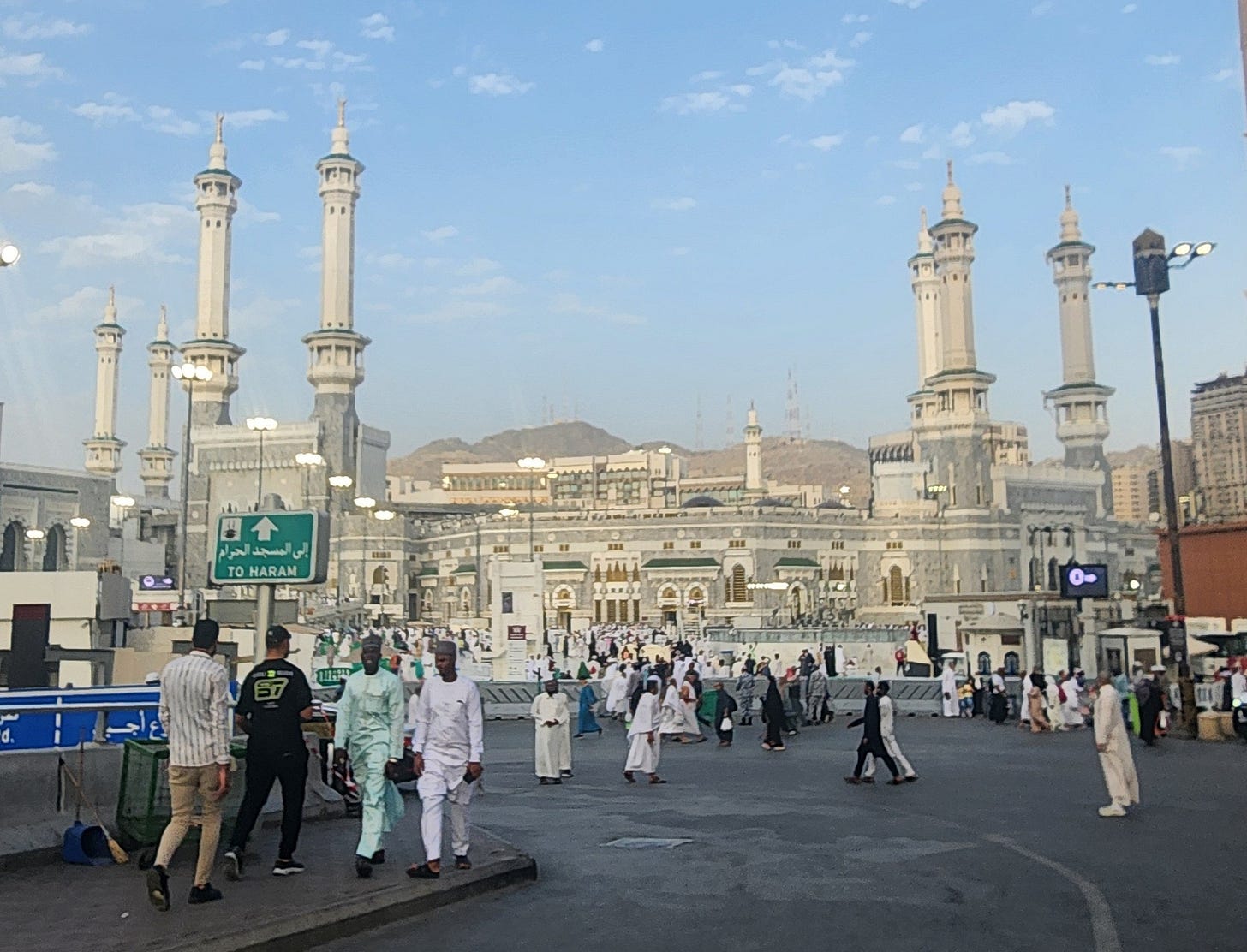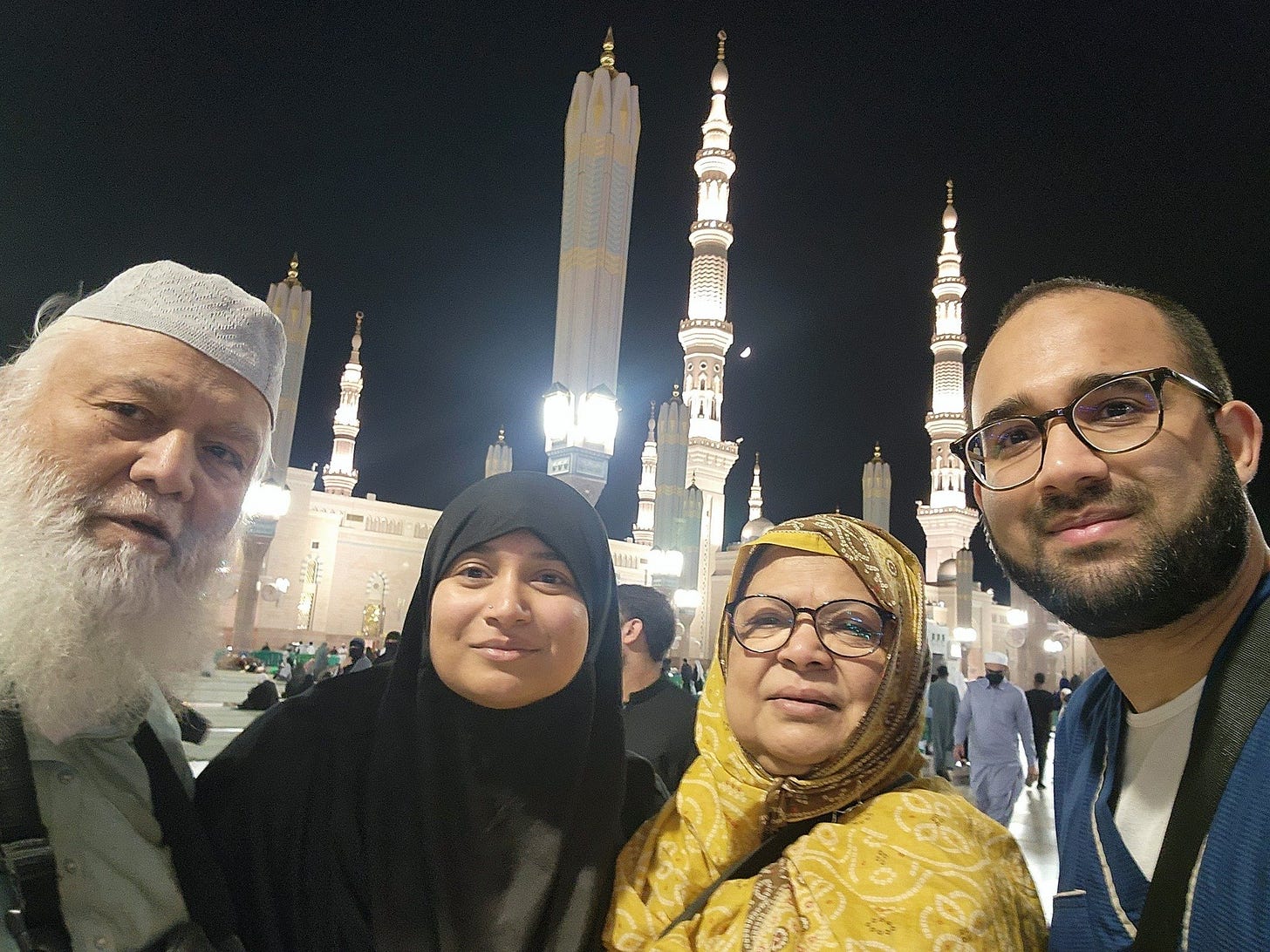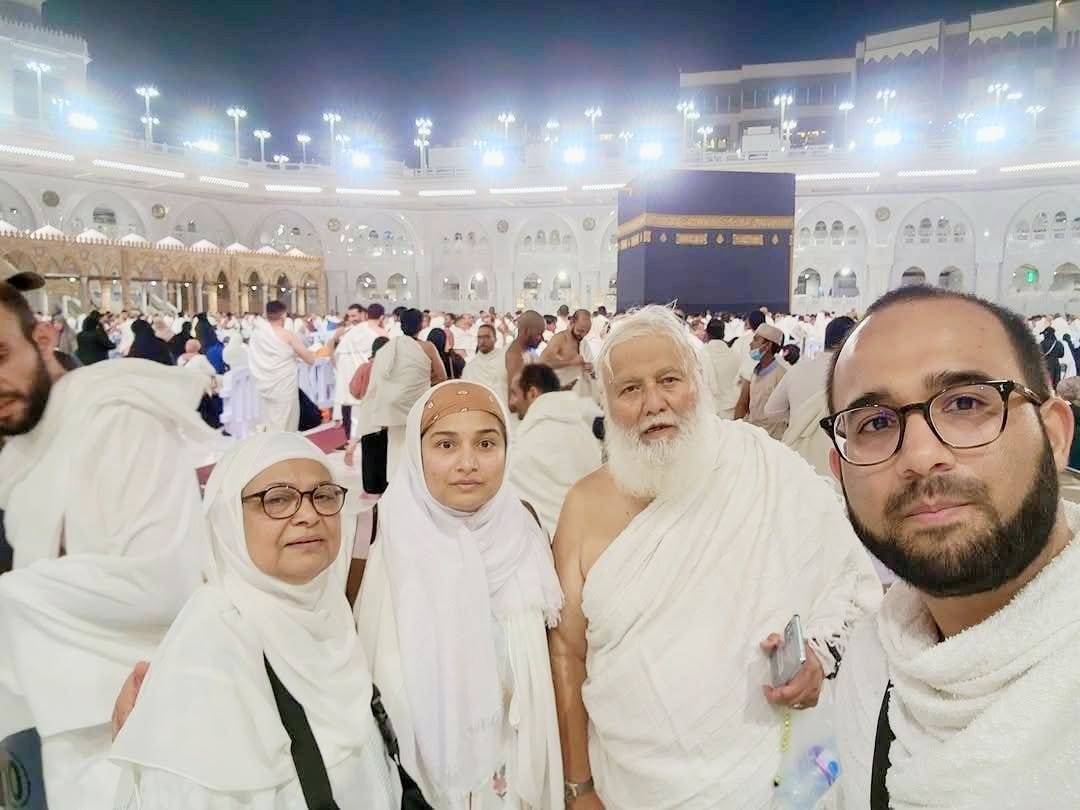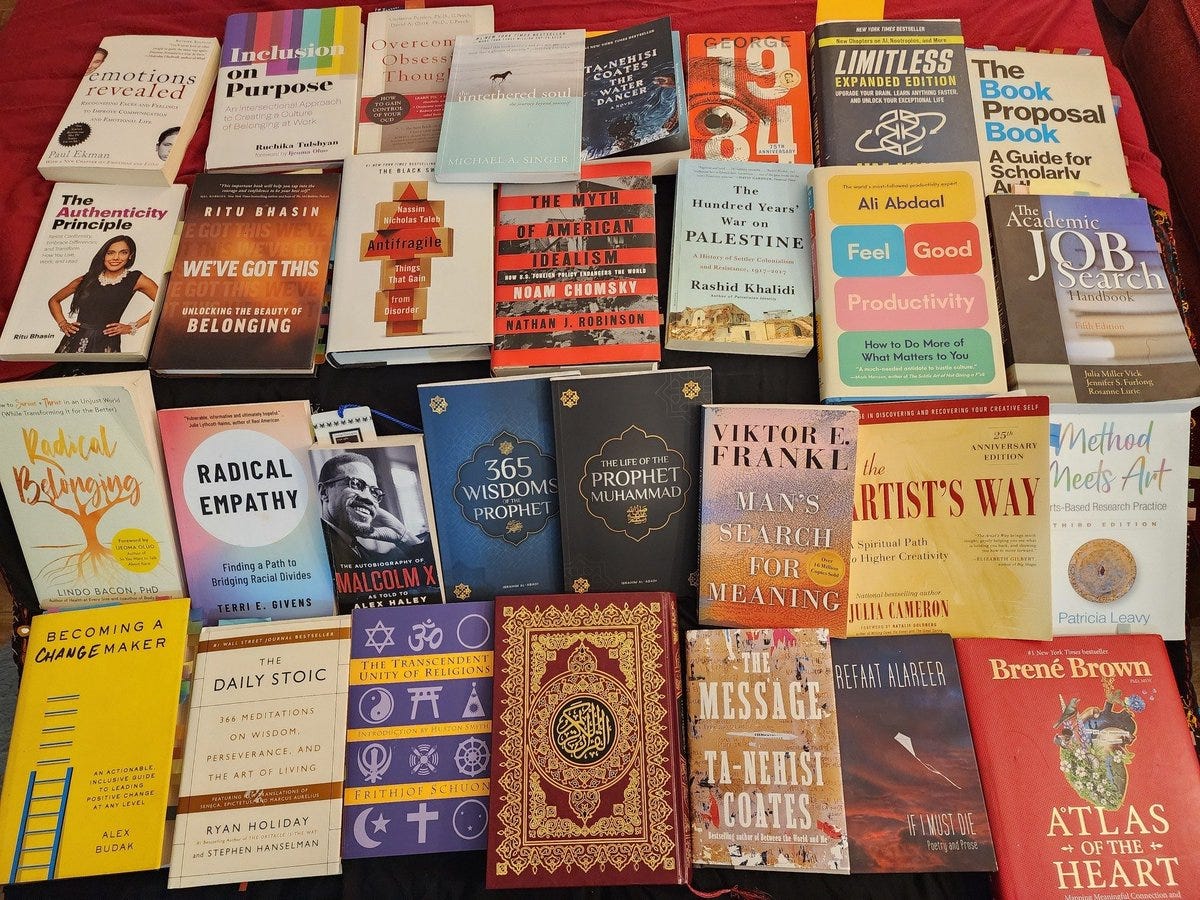Fieldnotes from a Sacred Journey: Practicing Qualitative Reflection in the Kingdom of Saudi Arabia
On Travels, Faith, and the Nonlinear Nature of Fieldwork from the Heart.
“The soul becomes dyed with the color of its thoughts.” - Marcus Aurelius
Dear qualitative Inquisitor,
Please pardon my absence here.
Between focusing on the holy month of Ramadan throughout March, managing a number of other responsibilities, and preparing for an unexpected overseas trip — my first in nearly three years — time slipped away more quickly than I anticipated.
But as we know, writing is a practice of timeless reflection, not perfect timing. Good writing doesn’t expire. It’s okay to sit with your work. It’s okay to take your time with the masterpiece you envision.
No matter how special this moment was for me, I have to accept that this may not yet be that masterpiece - and that's okay. It will come. We must trust the journey and trust the process.
And I am happy to return to you with this edition!
Earlier this month, I returned from an incredible experience in the Kingdom of Saudi Arabia, performing the Pilgrimage to Makkah with my family. We also spent several days in Madinah.
It has been a little over three weeks now, and I’ve been sitting with this draft throughout that time - reflecting on the powerful experience and trying to figure out where to go from here in my current transition.
While it was just a 10-day trip, it was the first time I was overseas in a Muslim country since my fieldwork in Pakistan. It had also been over two years since I last traveled overseas — a trip to the Republic of Georgia, where I had the opportunity to deliver an Invited Talk about my fieldwork in Pakistan.
I posted a few notes on Substack and across social media about my travels for the Pilgrimage to Makkah. It was my first time in the Kingdom of Saudi Arabia, and my first time completing this important rite in a Muslim’s life.
It was a beautiful gift from my younger brother, Sabih, (and other members of my family) and a precious time spent with my parents during the last ten days of Ramadan (the most sacred days of the month) and on Eid Day.
I had been taking the time to review my fieldnotes over the past few weeks.
Travel to Makkah and Madinah in the Kingdom of Saudi Arabia was not on my to-do list for 2025. It was an offer from my brother that I couldn’t refuse — and we surprised my parents, who had made the initial plans to go. They knew my brother was joining them, but they had no idea I would be coming too.
Sharing this experience on The Qualitative Inquisition also feels like a good segue into discussing qualitative fieldwork and various elements of the process. I have referred to qualitative fieldwork in previous posts but was slowly building up to it.
While my earlier posts mostly introduced elements that show the value of qualitative methods, inquiry, and intuition, there is still so much more to explore in terms of theory.
For now, though, I’m going to jump around a bit and make this a little less linear. The process of qualitative research itself is non-linear, and so was this incredible experience, a journey that doesn’t end with one visit to the field, just like the PhD, and just like qualitative fieldwork.
I can never fully separate the academic or professional parts of my life from any of my travels unfortunately; somehow, there’s always something work-related woven into the journey. And it had to be this time. I could see how there would be a connection here, too.
I spent the first half of my time in Madinah preparing for (and experiencing significant anxiety over) an interview. It was my first international interview for a professor position, and it happened to occur that same week, at least for the first part of the 10-day trip. Despite this, the overall experience in Madinah was still profoundly beautiful and spiritual.
That professional element made the experience even more meaningful, both spiritually and emotionally, especially given my ongoing transition and exploration of my next opportunity in academia.
During the trip, I took opportunities in between prayers and worship to write in my journal, documenting what I was feeling and experiencing at that moment. At times, I was so overwhelmed by simply being there that I didn’t always have the energy to write everything down. Can you relate?
Even now, there continues to be fleeting thoughts and powerful insights that it is nearly impossible to catch everything on paper and computer.
But I’m grateful I did what I could at that time, because even just a few notes can lead to more powerful reflections, even as time elapses.
I took notes, not just for personal reasons, but because it reminded me of my fieldwork — fieldwork I have not yet been able to return to, given life's challenges and circumstances that I’m still navigating five years after the pandemic.
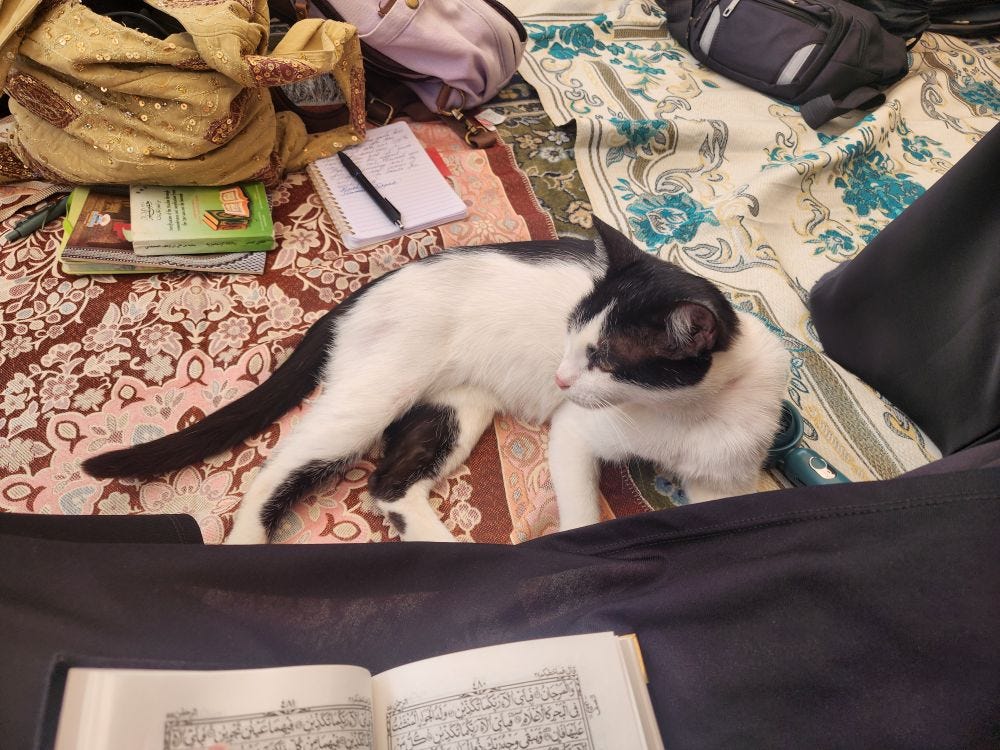
I am preparing a more comprehensive essay about this experience. I hope to share it in a future post.
For now, I wrote out my initial reflections the day after I returned, both in my journal and on Facebook, and later shared them (along with some additional thoughts) in my personal blog here:
Embracing the Heart of the Ultimate Revolution: Initial Reflections on Umrah
Please feel free to take a look.
I’m relieved and happy that I captured those reflections when I did.
Because with time and distance, we risk losing the raw sentiments and emotions unless we document them. Writing it all out — and preserving it — allows us to return to the experience later, and reclaim the value it offered us.
With an experience like this, no matter the level of your faith, no matter how much you study or read about the stories, there is nothing like seeing, feeling, and breathing in that history when you are there in person.
There is nothing like having your own stories — connecting the dots to events in your life — and watching how they nourish your spiritual journey. That’s how I feel about qualitative fieldwork, my most favorite part of my doctoral work.
We are often told (sometimes subtly, sometimes directly) that we should set aside our emotions and identities in our academic work. Qualitative inquiry refutes that claim. I believe that is precisely the problem when it comes down to belonging, authenticity, and inclusion in academia.
As my previous editions have touched upon — especially with the recent theme centered entirely on Identity — I have several observations on this tension, particularly as it relates to faith, religious freedoms, and belonging for people of faith.
And I want to start tackling these reflections here as well.
In the next several posts for The Qualitative Inquisition over the coming weeks, I will be sharing observations from my travels to Makkah and Madinah — including some reflections I posted earlier on Substacks notes and social media, as well as others I haven’t yet shared.
With my ongoing emphasis on reflexivity, storytelling, fieldwork/traveling, and authentic belonging — all of which I’ve touched on in past editions — this feels like the right space and the right moment to share the story from an important experience, which I believe will resonate with others who appreciate the spiritual journey, or be informative to those who want to learn more about Islam and Muslim world, or at least hear from a unique perspective.
I also hope it will serve as a natural segue into future discussions on qualitative fieldwork.
Reflection Prompts
In previous editions, I wrote about the importance of journaling and reflexivity, and what I have shared above demonstrates just that. Here are some prompts that could support you as you find meaning and value through your own travels and experiences:
How have your travels or life experiences influenced your personal, intellectual, or professional journey?
What role does faith, intuition, or inner knowing play in the way you approach your work or research?
In what ways have you felt the tension between belonging and authenticity in your professional or academic spaces?
How do you honor and document the moments that change you?
Book Recommendations - What I am Reading in 2025
This past week, on April 23rd, we celebrated World Book Day.
As a lover of books, I felt it would be important to mark the occasion. I decided to return to reading Man’s Search for Meaning by Viktor Frankl — shown in the photo above, in the second row, next to the book on the Prophet Muhammad (pbuh).
I also wrote a piece on Medium that shares some reflections on the book and its connection to Yom HaShoah, the Jewish Holocaust Remembrance Day:
On World Book Day: Reading to Remember and to Resist
As you know, I’ve included book recommendations in past editions of The Qualitative Inquisition, and the photo I shared above highlights books that continue to hold meaning for me this year — books I hope to read, recommend, and draw from throughout 2025.
One particularly significant book, especially given my travels to Saudi Arabia, is obviously The Holy Qur'an — featured in the bottom center of the photo.
It was the first Arabic version I ever purchased, a moment that felt deeply personal and symbolic during this trip, considering that I had just purchased the Quran months before.
I reflected on this experience in another recent post: The Book Beside Me.
Along with that, as I noted earlier, I returned to reading the Autobiography of Malcolm X, which became part of the inspiration for my decision to accept my brother’s invitation to perform Umrah with him and my parents at the end of Ramadan. In the forthcoming editions, I share some more recommendations and significance from the books featured.
Closing Reflection: Join the Qualitative Inquisition
Thank you for being here and for walking alongside me on this journey of reflection, inquiry, creativity, innovative social science research methods, and belonging.
I believe that every experience — whether personal or professional — holds a story worth uncovering, and I am grateful to have the chance to share part of mine with you here. I feel this experience weaves together travel, spirituality, and research, revealing beautiful stories along the way.
I look forward to continuing this exploration together, as I unpack my recent travels, revisit previous fieldwork, and offer insights that I hope will also support your own storytelling ventures.
Thank you for reading these observations, stories, and reflections from a very special place on Mother Earth.
I would love for you to subscribe and stay connected as I continue to share my passion for qualitative inquiry.
As we close the Month of Shawwal (Islamic Calendar), I extend a belated Ramadan Mubarak and Eid Mubarak to all Muslims.
And a Happy Belated Easter to all who celebrated.
Happy Reading!
In Solidarity and Peace,
Your fellow qualitative Inquisitor,
Dr. Elsa
Top News Roundup
The Pope Francis is Laid to Rest
Pope Francis Refused to be Silent on Gaza
Are India and Pakistan heading to War?
Mission Kashmir - The Kashmir Monitor
A Second Holocaust? - Israel is about to Empty Gaza by Chris Hedges
The First Livestreamed Genocide - Al Jazeera
The Genocide in Gaza Continues… Here’s a Look at Israel’s Plan for Ethnic Cleansing in Gaza by Mohamad El Masry
Remembering Gaza photojournalist Fatma Hassona by Omar Suleiman
*****
TRIVIA
Question: On the flag of Saudi Arabia, there is a sword beneath the Arabic inscription of the Shahada (the Islamic declaration of faith). What does the sword symbolize?
(Answer will be shared in the next edition!)
Previous Trivia Question:
Which rap album and artist is widely known for their powerful meditation on identity, authenticity, and systemic oppression, incorporating spoken-word elements and personal narratives?
Answer: To Pimp a Butterfly by Kendrick Lamar
*****
QUOTE OF THE MONTH
"We have returned from the lesser jihad to the greater jihad — the struggle against the self." - Prophet Muhammad (pbuh)


